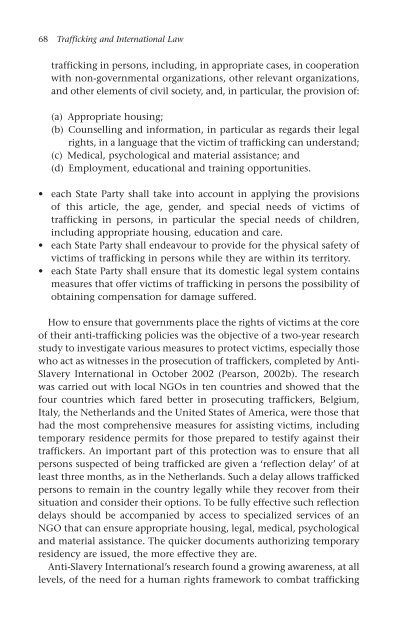3071-The political economy of new slavery
3071-The political economy of new slavery
3071-The political economy of new slavery
You also want an ePaper? Increase the reach of your titles
YUMPU automatically turns print PDFs into web optimized ePapers that Google loves.
68 Trafficking and International Law<br />
trafficking in persons, including, in appropriate cases, in cooperation<br />
with non-governmental organizations, other relevant organizations,<br />
and other elements <strong>of</strong> civil society, and, in particular, the provision <strong>of</strong>:<br />
(a) Appropriate housing;<br />
(b) Counselling and information, in particular as regards their legal<br />
rights, in a language that the victim <strong>of</strong> trafficking can understand;<br />
(c) Medical, psychological and material assistance; and<br />
(d) Employment, educational and training opportunities.<br />
• each State Party shall take into account in applying the provisions<br />
<strong>of</strong> this article, the age, gender, and special needs <strong>of</strong> victims <strong>of</strong><br />
trafficking in persons, in particular the special needs <strong>of</strong> children,<br />
including appropriate housing, education and care.<br />
• each State Party shall endeavour to provide for the physical safety <strong>of</strong><br />
victims <strong>of</strong> trafficking in persons while they are within its territory.<br />
• each State Party shall ensure that its domestic legal system contains<br />
measures that <strong>of</strong>fer victims <strong>of</strong> trafficking in persons the possibility <strong>of</strong><br />
obtaining compensation for damage suffered.<br />
How to ensure that governments place the rights <strong>of</strong> victims at the core<br />
<strong>of</strong> their anti-trafficking policies was the objective <strong>of</strong> a two-year research<br />
study to investigate various measures to protect victims, especially those<br />
who act as witnesses in the prosecution <strong>of</strong> traffickers, completed by Anti-<br />
Slavery International in October 2002 (Pearson, 2002b). <strong>The</strong> research<br />
was carried out with local NGOs in ten countries and showed that the<br />
four countries which fared better in prosecuting traffickers, Belgium,<br />
Italy, the Netherlands and the United States <strong>of</strong> America, were those that<br />
had the most comprehensive measures for assisting victims, including<br />
temporary residence permits for those prepared to testify against their<br />
traffickers. An important part <strong>of</strong> this protection was to ensure that all<br />
persons suspected <strong>of</strong> being trafficked are given a ‘reflection delay’ <strong>of</strong> at<br />
least three months, as in the Netherlands. Such a delay allows trafficked<br />
persons to remain in the country legally while they recover from their<br />
situation and consider their options. To be fully effective such reflection<br />
delays should be accompanied by access to specialized services <strong>of</strong> an<br />
NGO that can ensure appropriate housing, legal, medical, psychological<br />
and material assistance. <strong>The</strong> quicker documents authorizing temporary<br />
residency are issued, the more effective they are.<br />
Anti-Slavery International’s research found a growing awareness, at all<br />
levels, <strong>of</strong> the need for a human rights framework to combat trafficking


